MercoPress. South Atlantic News Agency
Brazil
-
Monday, November 26th 2012 - 23:32 UTC
Brazil’s largest city replaces all chiefs of police to contain an escalating wave of killings
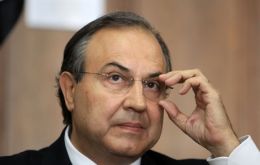
The chiefs of police in Sao Paulo were replaced on Monday as Brazil's largest city emerged from a bloody weekend and authorities struggled to contain a wave of violence that has doubled the murder rate in recent months.
-
Monday, November 26th 2012 - 19:54 UTC
“Fuleco” will rule over the 2014 Brazil World Cup

FIFA has named the mascot for the 2014 Brazil World Cup “Fuleco,” a word which organisers say transmits a message of environmental awareness, Football plus ecology.
-
Monday, November 26th 2012 - 06:46 UTC
Dilma Rousseff sacks top officials involved in influence-peddling ring

Brazilian president Dilma Rousseff moved quickly and with no consideration for political allies ordered the dismissal on Saturday of all government officials allegedly involved in a bribery ring, including the country's deputy attorney general.
-
Monday, November 26th 2012 - 04:35 UTC
Sao Paulo City gripped in a “civil war” between organized crime and the police, says top Judge
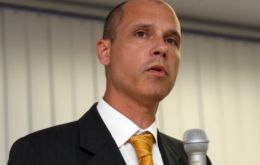
A Brazilian magistrate described the wave of killings in Sao Paulo city as a ‘civil war’ between organized crime and unsupported police forces to which the local population is closing its eyes.
-
Saturday, November 24th 2012 - 15:28 UTC
Brazilian Navy has its first woman two-star Rear Admiral

The Brazilian navy has its first woman two-star Rear Admiral, following the signing on Friday by President Dilma Rousseff of her promotion to the rank of Officer General of the Navy.
-
Friday, November 23rd 2012 - 23:41 UTC
‘Business climate’ up in Latam; lack of competitiveness and skilled labour remain challenges

Brazil, Bolivia and Chile had the best ‘business climate’ in Latin America during October according to the Economic Climate Index, ICE from the Brazilian think-tank Getulio Vargas Foundation, FGV.
-
Friday, November 23rd 2012 - 21:15 UTC
Brazil steering its currency to competitive ground for manufacturing
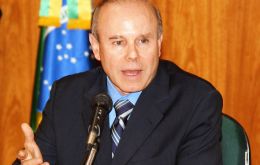
Brazil's exchange rate is at a reasonable level though not totally satisfactory said Finance Minister Guido Mantega on Friday, in an indication that the government is prepared to further weaken the Real to boost a still weak economy.
-
Friday, November 23rd 2012 - 20:15 UTC
Brazil has its first ever black head of the Supreme Court
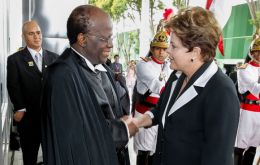
Brazil judge Joaquim Barbosa took the oath of office as Brazil's first ever Afro descendant head of the Federal Supreme Tribunal (Supreme Court) on Thursday, in a historic ceremony attended by President Dilma Rousseff and other top leaders.
-
Thursday, November 22nd 2012 - 21:09 UTC
Brazilian labour market robust with unemployment 5.3% in October
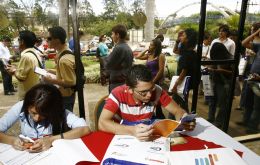
Brazil's unemployment rate fell in October, suggesting the country’s robust labour market will continue to support domestic demand through an incipient economic recovery.
-
Thursday, November 22nd 2012 - 21:05 UTC
Brazil government exposes alleged links of the opposition and media with the king of illegal gambling
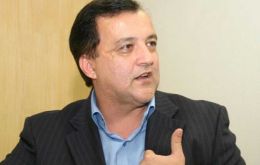
A Brazilian congressional committee has asked the Attorney General’s Office to prosecute on conspiracy charges two editors from the opposition magazine Veja because of their links with the chief of illegal gambling in the country, Carlinhos Cachoeira.
